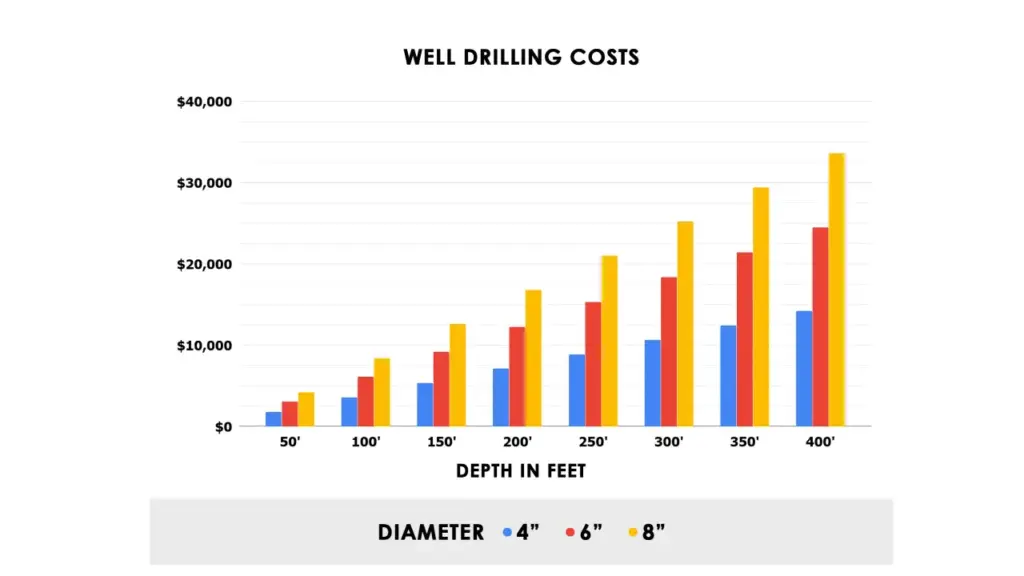Understanding the costs associated with geotechnical drilling is crucial for project planning and budgeting. This blog delves into the various factors that influence the overall expense of subsurface investigations. By exploring these elements, you can gain valuable insights into what to expect when budgeting for this essential phase of your project.
From the drilling method employed to the depth of investigation and site-specific conditions, numerous variables contribute to the final cost of geotechnical drilling. This guide aims to break down these components, providing a clearer picture of the financial considerations involved in obtaining critical subsurface data for your construction or engineering endeavors.
Geotechnical Drilling Cost Affect Factors
Several factors can significantly influence the cost of geotechnical drilling operations. Understanding these variables is essential for accurate budgeting and project planning.
Key affecting factors geotechnical drilling operation of the include:
- Depth of Boreholes: Deeper drilling requires more time, specialized equipment, and labor, directly increasing the overall cost per foot.
- Drilling Method: Different techniques (e.g., auger, rotary, core drilling) have varying equipment and operational costs, impacting the total expense.
- Subsurface Conditions: Hard rock, dense soils, or the presence of groundwater can slow drilling progress and necessitate specialized tools or fluids, raising costs.
- Site Accessibility: Difficult terrain, remote locations, or limited access can increase mobilization costs for equipment and personnel.
- Sampling and Testing Requirements: The number and type of samples required, as well as the complexity of laboratory testing, will add to the overall project expense.
- Regulatory Requirements: Permits, environmental regulations, and specific reporting standards can introduce additional costs.
- Location and Labor Rates: Regional differences in labor costs, equipment availability, and local market rates will influence pricing.
How Much Does Geotechnical Drilling Cost?

The cost of geotechnical drilling can vary significantly based on several factors, making it challenging to provide a precise figure without specific project details. However, understanding the typical cost range and the elements that influence it is crucial for budgeting. Generally, you can expect the cost to be influenced by:
- Depth of Boreholes: Deeper drilling equates to higher costs due to increased time, labor, and equipment wear. Costs can range from $15 to $100 or more per foot, depending on the method and complexity.
- Drilling Method: Simpler methods like auger drilling tend to be less expensive per foot than more advanced techniques like rotary or diamond core drilling, which require specialized equipment and expertise.
- Subsurface Conditions: Drilling through hard rock or encountering challenging soil conditions can slow progress and increase costs due to the need for specialized bits, fluids, or more robust equipment.
Overall, a typical geotechnical investigation involving drilling and a report can range from $1,000 to $5,000 or even higher for more complex projects. Factors such as the number of boreholes, the extent of laboratory testing required, site accessibility, and local labor rates will all contribute to the final cost. Obtaining detailed quotes from experienced geotechnical drilling firms in your specific location is always recommended for accurate cost estimation.
Here is a table showing the approximate costs associated with different geotechnical drilling methods. Please note that these are general ranges and actual costs can vary significantly based on the specific factors mentioned previously (depth, location, subsurface conditions, etc.).
| Drilling Method | Approximate Cost per Foot | Notes |
| Auger Drilling | $15 – $60+ | Generally less expensive, suitable for shallow depths in softer soils. |
| RAB (Rotary Air Blast) Drilling | $20 – $70+ | Cost-effective for rapid drilling in hard rock, but sample quality is lower. |
| Rotary Mud Drilling | $30 – $100+ | Versatile for various soil and rock, good borehole stability, but higher operational costs. |
| Diamond Core Drilling | $50 – $200+ | Highest quality samples in rock, but slower and more expensive. |
| Geotechnical Report (including drilling) | $1,000 – $5,000+ | Total cost for a typical investigation; can be significantly higher for complex projects. |
It’s crucial to obtain detailed quotes from local geotechnical drilling contractors for accurate cost estimates tailored to your specific project requirements in the United States.
How to Calculate Geotechnical Drilling Cost?
Calculating the cost of geotechnical drilling involves a systematic approach, considering various components that contribute to the overall expense. By breaking down the process into key steps, you can develop a more accurate budget for your subsurface investigation needs.
Define Project Scope and Objectives
The initial step involves clearly defining the goals of your geotechnical investigation. Determine the number, location, and anticipated depth of boreholes required to obtain the necessary subsurface information. Specify the types of samples needed (disturbed or undisturbed), any in-situ testing requirements (like SPT or CPT), and the scope of laboratory analyses. A well-defined scope will prevent unnecessary drilling and testing, helping to control costs.
Obtain Quotations from Drilling Contractors
Once the project scope is defined, the next crucial step is to solicit detailed quotations from multiple reputable geotechnical drilling contractors. Provide them with a clear and comprehensive description of your project requirements, including the number and depth of borings, anticipated soil conditions, sampling needs, and any site-specific access challenges. Comparing quotes from different contractors will allow you to assess the market rates and identify the most competitive and qualified service provider.
Analyze Quotations and Identify Cost Components
Carefully review each quotation to understand the breakdown of costs. Common components include mobilization and demobilization fees for equipment and personnel, per-foot drilling charges (which may vary based on depth and soil/rock type), sampling costs per sample, standby time charges (if applicable), and costs for consumables like drilling fluids and bits. Ensure that all quotations are based on the same scope of work to enable an accurate comparison.
Factor in Additional Costs
Beyond the drilling itself, remember to budget for additional expenses associated with a geotechnical investigation. These may include costs for site preparation (e.g., clearing vegetation or creating access roads), surveying and borehole location services, traffic control if drilling occurs in or near roadways, and the fees for the geotechnical engineer or consultant who will oversee the drilling, log the boreholes, and interpret the results in a final report. Laboratory testing fees for the collected samples should also be explicitly accounted for.
Geotechnical Drilling Cost Calculator
Geotechnical Drilling Cost Calculator
A Geotechnical Drilling Cost Calculator is a tool designed to provide an estimated cost for subsurface investigations. And the geotechnical drilling calculator often takes into account various factors that influence the final price, such as the number and depth of boreholes, the chosen drilling method (e.g., auger, rotary, core), anticipated soil or rock conditions, and the level of laboratory testing required.
This online Geotechnical Drilling Cost Calculator is a user-friendly tool designed to provide a preliminary estimate for the expenses associated with subsurface investigations. By inputting key project parameters, users can quickly get a rough idea of the potential costs involved. The calculator typically considers factors such as:
- Number of Boreholes: The total quantity of holes to be drilled directly impacts the overall cost.
- Average Depth per Borehole: Deeper drilling requires more time and resources, thus increasing the expense.
- Drilling Method: Different techniques like auger, rotary mud, and diamond core drilling have varying costs per foot due to equipment and operational complexity.
- Number of Samples per Borehole: The quantity of soil or rock samples collected influences laboratory testing fees.
- Estimated Cost per Sample: This allows users to input their anticipated cost for each laboratory analysis.
However, it’s crucial to recognize that this calculator provides an estimated cost and should not be considered a definitive quote. Real-world geotechnical drilling expenses can fluctuate significantly due to various site-specific and project-related factors not always accounted for in a basic online tool. These unaccounted factors often include:
- Site Accessibility: Challenging terrain or limited access can increase mobilization and drilling costs.
- Subsurface Conditions: Unexpectedly hard rock, the presence of groundwater, or contaminated soil can necessitate specialized equipment and procedures, affecting the price.
- Mobilization and Demobilization Fees: The cost of transporting equipment and personnel to and from the site.
- Standby Time: Charges incurred if drilling operations are delayed due to unforeseen circumstances.
- Reporting and Consulting Fees: The cost of the geotechnical engineer’s time for supervision, logging, and report preparation.
- Local Market Rates: Variations in labor and equipment costs depending on the geographic location.
Therefore, while this online calculator offers a helpful starting point for budgeting, obtaining detailed and tailored quotations from experienced geotechnical drilling contractors in your specific area remains essential for accurate cost assessment.
Conclusion
Understanding geotechnical drilling costs is crucial for project planning and budgeting. As this blog likely outlines, expenses vary significantly based on factors like drilling method, depth, site conditions, and the extent of laboratory testing required. Accurate cost estimation ensures financial feasibility and helps in selecting the most appropriate investigation approach.
For those seeking cost-effective solutions, sourcing drilling tools directly from a manufacturer can offer significant savings. Sinodrills, a drilling tool manufacturer from China, provides wholesale geotechnical drilling tools. Partnering with a direct supplier can streamline procurement and potentially reduce overall project expenses.
By carefully considering project requirements and exploring wholesale options like those offered by Sinodrills, you can manage geotechnical drilling costs effectively. Investing in quality tools from a reliable manufacturer can contribute to efficient operations and accurate subsurface investigations, ultimately supporting successful project outcomes.


